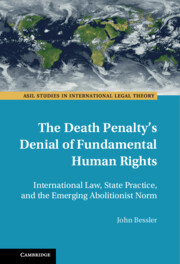 The Death Penalty's Denial of Fundamental Human Rights
The Death Penalty's Denial of Fundamental Human Rights Book contents
- The Death Penalty’s Denial of Fundamental Human Rights
- ASIL Studies in International Legal Theory
- Frontispiece
- The Death Penalty’s Denial of Fundamental Human Rights
- Copyright page
- Dedication
- Epigraph
- Contents
- Preface
- Acknowledgments
- Introduction
- 1 The Death Penalty
- 2 The Abolitionist Movement
- 3 Death Threats and the Law of Torture
- 4 Human Dignity and the Law’s Evolution
- Conclusion
- Bibliography
- Index
4 - Human Dignity and the Law’s Evolution
Prohibiting Capital Punishment through a Jus Cogens Norm
Published online by Cambridge University Press: 01 December 2022
- The Death Penalty’s Denial of Fundamental Human Rights
- ASIL Studies in International Legal Theory
- Frontispiece
- The Death Penalty’s Denial of Fundamental Human Rights
- Copyright page
- Dedication
- Epigraph
- Contents
- Preface
- Acknowledgments
- Introduction
- 1 The Death Penalty
- 2 The Abolitionist Movement
- 3 Death Threats and the Law of Torture
- 4 Human Dignity and the Law’s Evolution
- Conclusion
- Bibliography
- Index
Summary
The chapter traces the origins of human dignity, showing how it was originally used to denote titles of honor but is now seen as a universal human right or as undergirding universal human rights. In the context of discussing dignity rights, the chapter highlights international human rights treaties and national constitutions making refeerence to the concept of human dignity, which, in modern usage, has to do with the inherent worth of a life. The chapter discusses how human dignity is the foundation for many human rights, including the right to life, the right to be free from torture and other forms of cruelty, and the right to be free of discrimination. The chapter describes existing jus cogens norms prohibiting various acts that violate fundamental human rights, concluding that the death penalty must be abolished because it makes use of credible death threats, inflicts psychological torture, and violates an array of basic human rights. The chapter details how non-lethal corporal punmishments have already been abandoned and how the death penalty has been abolished or curtailed in many countries, with international criminal law tribunals precluding the death penalty's use.
Keywords
- Type
- Chapter
- Information
- The Death Penalty's Denial of Fundamental Human RightsInternational Law, State Practice, and the Emerging Abolitionist Norm, pp. 209 - 263Publisher: Cambridge University PressPrint publication year: 2022


